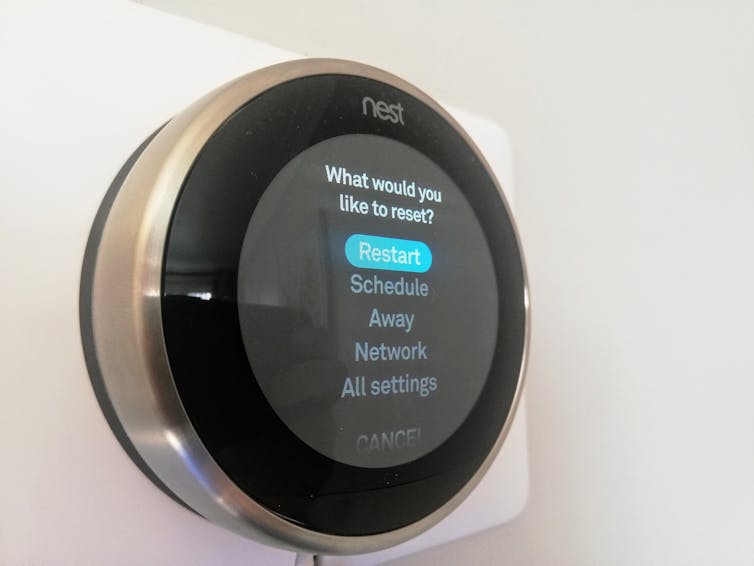What Your Smart Devices Know About You
Have you ever felt a creeping awareness that someone'due south watching you? So you plough effectually and you don't encounter anything out of the ordinary. Depending on where you were, though, you might not have been completely imagining information technology. In that location are billions of things sensing you every twenty-four hour period. They are everywhere, hidden in plain sight – inside your TV, fridge, automobile and office. These things know more than near you than y'all might imagine, and many of them communicate that information over the internet.
Back in 2007, it would have been hard to imagine the revolution of useful apps and services that smartphones ushered in. Simply they came with a cost in terms of intrusiveness and loss of privacy. As computer scientists who written report data direction and privacy, we observe that with net connectivity extended to devices in homes, offices and cities, privacy is in more danger than ever.
Internet of Things
Your appliances, car and home are designed to make your life easier and automate tasks you perform daily: switch lights on and off when you lot enter and get out a room, remind you that your tomatoes are about to go bad, personalize the temperature of the house depending on the conditions and preferences of each person in the household.
To do their magic, they need the net to attain out for help and correlate data. Without internet admission, your smart thermostat can collect data about you, but it doesn't know what the weather forecast is, and it isn't powerful enough to process all of the data to decide what to exercise.

But it's not just the things in your domicile that are communicating over the internet. Workplaces, malls and cities are also becoming smarter, and the smart devices in those places have similar requirements. In fact, the Internet of Things (IoT) is already widely used in send and logistics, agronomics and farming, and industry automation. There were around 22 billion net-connected devices in employ around the globe in 2018, and the number is projected to grow to over fifty billion by 2030.
What these things know well-nigh you
Smart devices collect a wide range of information well-nigh their users. Smart security cameras and smart administration are, in the end, cameras and microphones in your dwelling house that collect video and audio information about your presence and activities. On the less obvious end of the spectrum, things like smart TVs utilise cameras and microphones to spy on users, smart lightbulbs track your slumber and centre rate, and smart vacuum cleaners recognize objects in your abode and map every inch of it.
Sometimes, this surveillance is marketed as a feature. For example, some Wi-Fi routers can collect information almost users' whereabouts in the home and fifty-fifty coordinate with other smart devices to sense motility.
Manufacturers typically promise that only automated controlling systems and not humans see your data. But this isn't always the example. For example, Amazon workers heed to some conversations with Alexa, transcribe them and annotate them, before feeding them into automated decision-making systems.
Just even limiting admission to personal information to automated decision making systems can have unwanted consequences. Any individual data that is shared over the cyberspace could be vulnerable to hackers anywhere in the world, and few consumer net-connected devices are very secure.
Empathize your vulnerabilities
With some devices, like smart speakers or cameras, users tin occasionally turn them off for privacy. However, even when this is an pick, disconnecting the devices from the cyberspace tin can severely limit their usefulness. You also don't have that pick when yous're in workspaces, malls or smart cities, then you could be vulnerable even if you don't own smart devices.
Therefore, every bit a user, it is important to make an informed decision by understanding the trade-offs betwixt privacy and comfort when buying, installing and using an internet-continued device. This is not always easy. Studies have shown that, for example, owners of smart home personal assistants have an incomplete understanding of what information the devices collect, where the information is stored and who can admission it.

Governments all over the world have introduced laws to protect privacy and give people more control over their information. Some examples are the European General Data Protection Regulation (GDPR) and California Consumer Privacy Human activity (CCPA). Thanks to this, for instance, you tin can submit a Information Field of study Access Asking (DSAR) to the organization that collects your data from an internet-connected device. The organizations are required to respond to requests within those jurisdictions inside a calendar month explaining what data is collected, how information technology is used within the organization and whether it is shared with any tertiary parties.
Limit the privacy damage
Regulations are an of import step; all the same, their enforcement is likely to take a while to catch up with the e'er-increasing population of internet-connected devices. In the concurrently, there are things you tin can do to take advantage of some of the benefits of cyberspace-connected without giving abroad an inordinate amount of personal information.
If you lot own a smart device, yous tin can take steps to secure it and minimize risks to your privacy. The Federal Merchandise Commission offers suggestions on how to secure your internet-continued devices. Ii key steps are updating the device's firmware regularly and going through its settings and disabling any data drove that is not related to what you want the device to do. The Online Trust Alliance provides boosted tips and a checklist for consumers to ensure safe and individual use of consumer internet-connected devices.
If you are on the fence well-nigh purchasing an internet-connected device, observe out what data information technology captures and what the manufacturer's data management policies are from independent sources such as Mozilla's Privacy Non Included. Past using this information, y'all tin can opt for a version of the smart device y'all want from a manufacturer that takes the privacy of its users seriously.
[Over 150,000 readers rely on The Conversation'due south newsletters to empathize the world. Sign upward today.]
Last but not to the lowest degree, you can break and reverberate on whether you lot really demand all your devices to be smart. For example, are y'all willing to give abroad information virtually yourself to exist able to verbally command your java car to make y'all a java?
Source: https://theconversation.com/smart-devices-spy-on-you-2-computer-scientists-explain-how-the-internet-of-things-can-violate-your-privacy-174579
0 Response to "What Your Smart Devices Know About You"
Post a Comment